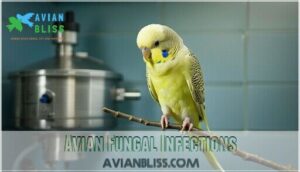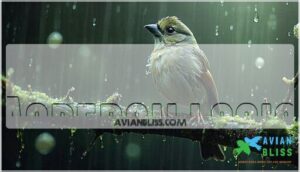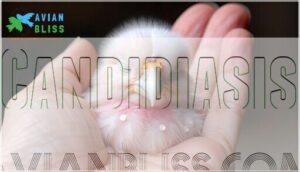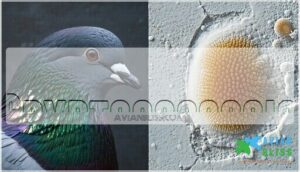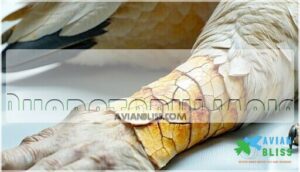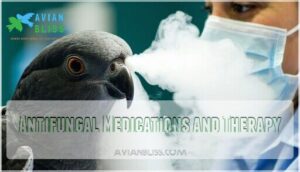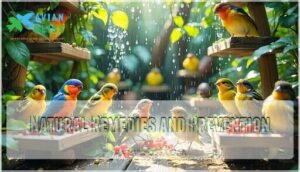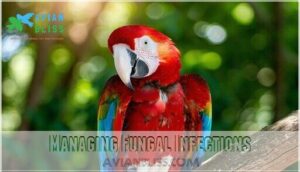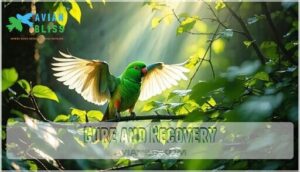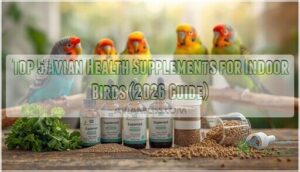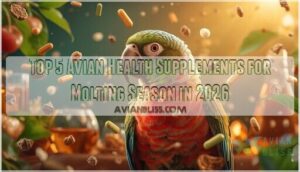This site is supported by our readers. We may earn a commission, at no cost to you, if you purchase through links.
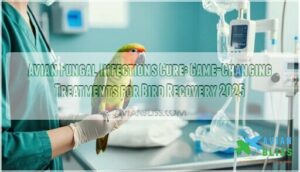
You’ll likely use antifungal medications, such as itraconazole or amphotericin B, delivered orally, topically, or through inhalation, depending on your bird’s needs.
Surgery may be necessary for stubborn fungal plaques, but it requires an expert avian vet.
Supportive care, like oxygen therapy and nutritional support, plays a huge role too.
Prevention is key—maintain a clean, well-ventilated environment, as fungi thrive in damp conditions.
Think of it like keeping mold out of your bathroom!
And remember, consistent check-ups guarantee long-term recovery and health.
Table Of Contents
- Key Takeaways
- Avian Fungal Infections
- Types of Fungal Infections
- Diagnosis and Treatment
- Natural Remedies and Prevention
- Managing Fungal Infections
- Cure and Recovery
- Frequently Asked Questions (FAQs)
- What is the fastest way to cure a fungal infection?
- What antifungal medicine do birds take?
- How do you treat fungal infection in poultry?
- Can birds recover from aspergillosis?
- What are the treatment options for avian fungus?
- How to manage angular cheilitis at home?
- How do avian species manage fungal infections?
- How do you treat a fungus in a bird?
- How is avian gastric yeast treated?
- How do you treat a yeast infection in a bird?
- Conclusion
Key Takeaways
- Use antifungal medications like itraconazole, amphotericin B, or nystatin to treat fungal infections effectively.
- Keep your bird’s environment clean, dry, and well-ventilated to stop fungi from thriving.
- Boost your bird’s recovery with proper nutrition, including vitamin A-rich foods, probiotics, and a balanced diet.
- Act quickly if you notice signs like labored breathing, white mouth lesions, or weight loss, and consult an avian vet for treatment.
Avian Fungal Infections
You’ll encounter fungal infections like aspergillosis and candidiasis in birds when their immune systems are compromised by stress, poor nutrition, or unsanitary conditions.
These infections primarily affect the respiratory and digestive systems, causing symptoms such as breathing difficulties, white mouth lesions, lethargy, and weight loss that require prompt veterinary attention.
Causes and Risk Factors
Most fungal infections in birds occur when several risk factors converge.
Environmental spores, particularly Aspergillus, are everywhere in soil and moldy materials, acting as an environmental contaminant rather than a contagious disease.
Your bird’s susceptibility increases with immune suppression from steroids, antibiotics, or stress factors.
Poor hygiene practices create perfect conditions for fungal growth, while nutritional deficiencies, especially vitamin A deficiency, weaken respiratory defenses.
Even healthy birds can develop infections when exposed to a high concentration of spores in poorly ventilated areas, which can lead to respiratory defenses being compromised.
Clinical Signs and Symptoms
Recognizing the subtle warning signs of avian fungal infections requires vigilance. Your bird may exhibit respiratory distress, including tail bobbing and labored breathing, or show digestive issues like regurgitation and weight loss.
Stay vigilant—watch for tail bobbing, labored breathing, or regurgitation as early signs of fungal infections in birds.
Watch for behavioral changes such as lethargy and fluffed feathers, which often signal distress. Skin lesions may appear in advanced cases, particularly with rhodotoruliasis.
Neurological signs including disorientation or head tilting can indicate cryptococcosis has spread. Early recognition of these clinical signs substantially improves treatment outcomes for fungal infection symptoms in birds, leading to better treatment outcomes.
Types of Fungal Infections
You’ll find that fungal infections in birds come in several forms, each with its own unique challenges.
From respiratory aspergillosis to skin-affecting rhodotoruliasis, understanding these types helps you identify issues and take action quickly, which is crucial for effective treatment.
Aspergillosis
Aspergillosis, a common avian fungal infection, stems from inhaling spores of Aspergillus species, often lurking in moist nesting materials or moldy food.
Chronic aspergillosis leads to respiratory distress and granuloma formation, challenging birds’ survival.
Effective avian aspergillosis treatment includes antifungal medications, environmental control, and quality hygiene practices.
Implementing proper ventilation can aid in prevention of fungal infections. Catching problems early makes a big difference, saving your bird from this lurking respiratory threat.
Candidiasis
Candidiasis, or Crop Mycosis, is a common avian fungal infection caused by Candida albicans.
You might notice white oral plaques, digestive issues, or yeast overgrowth. It often impacts birds’ avian digestive health.
Young birds are especially vulnerable. Treatment typically includes nystatin or fluconazole, targeting yeast directly.
Quick care prevents complications, keeping your bird chirping happily!
Cryptococcosis
Cryptococcosis, linked to pigeon feces, is a tricky avian fungal infection. It can cause neurological issues, respiratory distress, and even blindness.
Watch for these telltale signs:
- Weakness and lethargy in birds.
- Yeast capsule presence in diagnostic samples.
- Dyspnea (breathing problems).
- Zoonotic potential—humans aren’t immune to exposure.
Antifungal drugs like itraconazole often fail without early avian vet intervention, which highlights the importance of early detection and treatment.
Rhodotoruliasis
Rhodotoruliasis often targets raptors’ skin, causing greasy, crusty lesions. You’ll spot cracked, discolored patches that need immediate care.
Treatment starts with crust removal, using topical antifungals, and restricting movement to aid healing. Secondary infections can arise, so antibiotics help prevent this.
Here’s a quick overview:
| Symptom | Treatment | Prognosis |
|---|---|---|
| Skin Crusts | Crust Removal | Moderate |
| Discoloration | Topical Treatments | Manageable |
| Secondary Infections | Antibiotics | Preventable |
Turn to antifungal drugs for birds like terbinafine to manage this avian fungal infection.
Diagnosis and Treatment
You’ll need a clear diagnosis to tackle fungal infections in birds effectively, which often requires advanced tests like imaging and tissue sampling.
Treating these infections involves careful use of antifungals, along with supportive care to give your feathered friend the best chance at recovery.
Laboratory Tests and Imaging
When identifying fungal infections like aspergillosis in birds, accurate avian fungal diagnostics matter.
Vets often rely on sample collection for cytology analysis, radiographs for abnormal respiratory patterns, and advanced tools like PCR testing and DNA tests.
Serology tests detect immune responses, while histopathology examines tissue changes.
Radiographic findings help pinpoint infections quickly, offering a clear picture of what’s going on internally, which is crucial for effective treatment.
Antifungal Medications and Therapy
Antifungal therapy plays a pivotal role in tackling avian fungal infections.
Itraconazole dosage must be precise, as it’s widely trusted for bird antifungal medication.
Beware of Amphotericin side-effects like kidney issues.
For tough cases or terbinafine resistance, combination therapies shine.
Nebulization therapy is stress-free, delivering antifungal drugs directly.
Many owners seek effective bird treatments online for their pets.
Antifungal medications demand patience—weeks or months may pass before full recovery, making effective treatment crucial.
Supportive Care and Hospitalization
When antifungal treatments start, supportive care becomes your bird’s lifeline.
Avian veterinarians prioritize isolation protocols to prevent stress, while fluid therapy balances hydration.
Nutritional support addresses malnutrition, ensuring recovery gains traction.
Environmental control, like clean air and hygiene, reduces fungal exposure, and pain management keeps birds comfortable.
Skilled avian specialists monitor avian patients, providing exceptional avian veterinary care throughout hospitalization.
Natural Remedies and Prevention
You can support your bird’s recovery from fungal infections by using natural remedies like antifungal herbs and essential oils, paired with proper nutrition.
Maintaining good hygiene and creating a clean, stress-free environment also plays a vital role in prevention and overall health, by ensuring your bird has the best chance to recover and thrive with proper nutrition.
Herbs and Essential Oils With Antifungal Properties
While antifungal drugs for birds remain essential, Herbal Antifungals and Essential Oil Benefits offer exciting Natural Remedies.
Cinnamon and clove oils, known for strong antifungal activity, support holistic treatments like misting or topical care.
Combining oils like palmarosa with blends enhances bird fungal treatment, and Avian antifungal herbs can provide additional support.
Safe use boosts immune support, complementing modern bird antifungal drugs, and Always consult experts.
Dietary Changes and Nutritional Requirements
Your bird’s diet can greatly influence recovery.
To combat avian fungal infections:
- Add Vitamin A–rich foods like sweet potatoes and carrots to strengthen immunity.
- Include probiotics to balance digestion and fight fungal overgrowth.
- Switch to seed-free diets with varied grains, veggies, and fruits to prevent nutritional deficiencies.
Boosting hydration promotes maximal body function.
Consistent feeding site management also aids prevention.
A healthy bird diet means a healthy bird, emphasizing the importance of a healthy bird diet and overall recovery.
Good Husbandry Practices and Environment
Keeping your bird healthy starts with maintaining clean cages, proper ventilation, and quality food and water storage.
Stressed birds are more prone to illness, so minimizing disturbances matters.
Regular cleaning and sanitizing guarantee hygiene, while proper ventilation prevents fungal growth.
For effective cage maintenance, consider using a specialized cleaning product.
Here’s a quick guide:
| Task | Frequency | Tools Needed | Notes |
|---|---|---|---|
| Cage Cleaning | Weekly | Brushes, safe cleaners | Avoid harsh chemicals |
| Ventilation Quality | Daily checks | Hygrometer, fan | Aim for good airflow |
| Food Storage | Always airtight | Sealed containers | Prevents mold contamination |
| Water Sanitation | Daily | Fresh water, clean bowls | Avoid algae buildup |
Maintaining your bird’s environment requires attention to proper ventilation, quality food, and water storage to prevent illness and ensure a healthy life.
Managing Fungal Infections
You can manage fungal infections in birds by addressing the specific species affected and understanding their unique needs.
Staying vigilant with follow-up care and monitoring guarantees better recovery outcomes while preventing complications from untreated infections, which is crucial for recovery.
Specific Avian Species and Fungal Infections
Different avian species face unique fungal challenges.
Parrot Aspergillosis arises from inhaling spores, while Budgie Candidiasis targets the gut.
Raptors battle Raptor Rhodotoruliasis on their skin, and Waterfowl Mucormycosis invades organs.
To protect your feathered friend:
- Spot signs early (breathing issues, weight loss).
- Maintain hygiene.
- Use antifungal drugs for birds.
- Provide diverse nutrition.
- Reduce harmful stressors.
Recognizing symptoms early can help, so monitor for signs of illness.
Complications and Prognosis of Untreated Infections
Without treatment, fungal infections can wreak havoc, leading to organ damage, systemic spread, and high mortality rates.
Long-term effects like reduced lifespan or relapses complicate a bird’s fungal infection prognosis, and subtle clinical signs often mask underlying disease, delaying action.
Ignoring these infections risks severe damage, as untreated cases escalate rapidly, and addressing issues early is crucial to avoid unfixable harm and ensure a better outcome, which is why it is vital to take prompt action to prevent severe damage.
Monitoring and Follow-up Care
When managing fungal infection prognosis in birds, monitoring matters to prevent relapse.
Stick to your avian vet’s care plan; it’s about consistency!
- Follow medication schedules to aid recovery and avoid long-term effects.
- Watch for behavioral changes, like lethargy, signaling recurring issues.
- Schedule check-ups for treating sick birds effectively, ensuring quality of life improves with avian medicine.
Cure and Recovery
You can help your bird achieve recovery with targeted treatments that tackle the infection as well as strengthen its overall health.
By addressing factors like survival rates, reinfection risks, and holistic care, you’ll set the stage for long-term wellness.
Treatment Outcomes and Survival Rates
Treating avian aspergillosis and other fungal infections hinges on antifungal efficacy and swift action.
Survival factors like early diagnosis, proper treatment duration, and relapse prevention play key roles.
Antifungal drugs for birds, such as voriconazole, improve survival rates.
While treatment success varies, long-term effects highlight that consistent avian fungal disease control guarantees better fungal infection prognosis, reducing complications substantially over time, which is crucial for better fungal infection prognosis.
Preventing Reinfection and Recurrence
How can you prevent a bird fungal infection from returning? Stick to strong hygiene protocols—clean cages and equipment thoroughly.
Boost the bird immune system using probiotic supplements and vitamin-rich diets. Reduce stress with a stable routine and proper bird ventilation.
Quarantine procedures for new birds are key. These steps in fungal infection prevention keep your birds healthy and thriving.
To further bolster prevention, consider implementing avian parasite control to ensure complete concepts of bird health are covered, using stable routine for overall well-being.
Holistic Approaches to Avian Fungal Infections
Supporting your bird’s recovery requires exploring natural solutions.
Herbal antifungals, like oregano or garlic extracts, complement antifungal drugs for birds.
Add dietary support and immune-boosting nutrients, including vitamin A, to enhance the bird immune system.
Probiotic therapy aids gut health, while stress reduction through a calm environment can prevent new infections.
Holistic bird nutrition fosters long-term fungal infection prevention for birds.
Frequently Asked Questions (FAQs)
What is the fastest way to cure a fungal infection?
The fastest way to treat a fungal infection is using prescribed antifungal medication, like itraconazole or fluconazole.
Alongside improving hygiene, nutrition, and reducing stress, a vet’s guidance guarantees personalized care for effective recovery.
What antifungal medicine do birds take?
Birds often take antifungal medicines like itraconazole, amphotericin B, or terbinafine to treat infections, depending on the severity and type.
Always consult an avian vet; improper usage can ruffle more feathers than it helps, which is why consulting a professional is crucial to ensure the proper treatment is administered.
How do you treat fungal infection in poultry?
To treat fungal infections in poultry, make certain clean housing, avoid damp conditions, and provide a balanced diet.
Use antifungal medications like nystatin or itraconazole under veterinary guidance, paired with supportive care to boost recovery.
Can birds recover from aspergillosis?
Fighting aspergillosis is like climbing a steep hill; recovery depends on early treatment.
With antifungals, supportive care, and environmental changes, birds can improve, though severe cases often pose challenges.
A vet’s expertise is essential.
What are the treatment options for avian fungus?
When treating avian fungus, veterinarians may prescribe antifungals like itraconazole, amphotericin B, or terbinafine.
Supportive care, environmental cleaning, surgical debridement, and dietary improvements are essential steps to help your feathered friend bounce back, including the use of medications like amphotericin B.
How to manage angular cheilitis at home?
To manage angular cheilitis at home, keep the area dry and clean, apply a thin layer of petroleum jelly or coconut oil.
Use over-the-counter antifungal cream if needed.
Avoid licking your lips—it worsens irritation!
How do avian species manage fungal infections?
You handle avian fungal infections by ensuring proper hygiene, balanced nutrition, and minimizing stress.
Consult a vet early, as antifungal medications, diagnostic tests, and sometimes surgery are key tools in treating severe cases effectively, using proper hygiene as a foundation.
How do you treat a fungus in a bird?
Ever wonder why your bird’s health takes a sudden nosedive?
Treat fungal infections with vet-prescribed antifungals, like itraconazole, and improve hygiene.
Balanced diets and stress reduction boost immunity, keeping your feathered friend chirping happily!
How is avian gastric yeast treated?
You can treat avian gastric yeast with amphotericin B (100 mg/kg, orally, twice daily for 30 days).
Pair this with improved hygiene and proper nutrition to boost your bird’s immune system and overall health.
How do you treat a yeast infection in a bird?
A bird’s yeast infection, like sour crop, is tackled with antifungal treatments such as nystatin or fluconazole.
Pair medication with clean habitats, proper diets, and stress reduction to support recovery and prevent future outbreaks.
Conclusion
Think of avian fungal infections as weeds in a garden—without proper care, they spread quickly.
By combining targeted antifungal treatments, supportive care, and diligent prevention, you can effectively tackle these infections and set your bird on the path to recovery.
Whether it’s managing Aspergillosis or preventing recurrence, a clean, ventilated living space and routine vet visits are essential.
With the right approach, curing avian fungal infections becomes achievable, ensuring your feathered friend thrives once again, thanks to proper care and diligent prevention.

